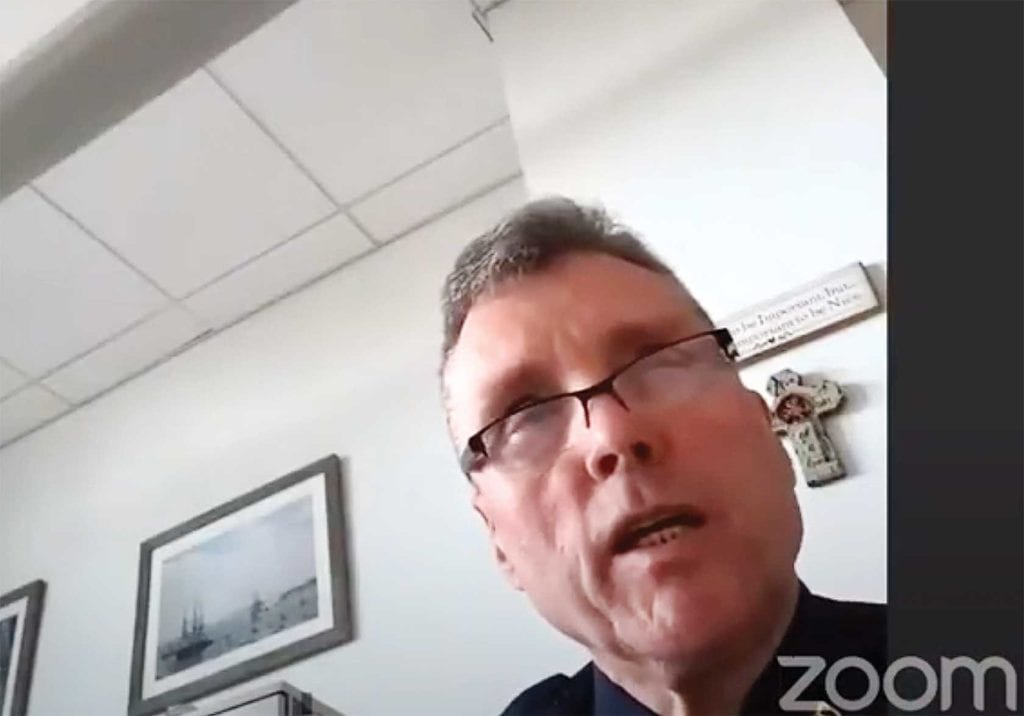Council zeroes in on Boston police overtime
Councilors press police on court overtime appearances, oversight

In 2019, Boston police officers who received overtime while working in court spent 55,202 hours in courthouses. Yet under the Boston Police Department’s overtime rules, which mandate a minimum of four hours’ pay, they were paid for 115,853 hours of work.
During a Boston City Council hearing Monday in which councilors questioned police brass on overtime, court appearances were featured prominently. District 5 Councilor Ricardo Arroyo zeroed in on court overtime, questioning BPD Superintendent James Hasson on a specific officer’s hours. According to Arroyo, data provided by the police department showed officer Waiman Lee working overtime in court on 245 days.
“How is it possible that he is off duty 245 days?” Arroyo questioned, estimating that Boston courthouses are in session for 246 days a year, accounting for holidays. “I’m just trying to figure out how it’s possible for someone to be in court almost every day it’s in session and be off duty.”
Hasson said Lee works nights, so his court appearances count as overtime. Lee has been one of the department’s top earners, pulling in $403,000 in 2016 — more than any other city employee.
Hasson said Lee must appear in court to present evidence. Arroyo suggested transferring evidence to the court might better be handled electronically rather than paying an officer overtime to show up and present paper versions of evidence.
“That is a packet that should just be Dropboxed or emailed,” he said, referring to a popular file-sharing website.
Police overtime for court appearances hit the public spotlight in September, when the Banner revealed that police records shared with the City Council showed 125 instances of officers claiming overtime in court while they appeared to be making arrests or conducting field intelligence observation reports or traffic stops miles from the nearest courthouse.
Police officials in September said they opened an investigation of the overtime records. Arroyo asked Hasson whether that investigation is limited to the records in the Banner article, culled from incident reports in which only the arresting officer is named, or whether the department is extending the investigation to include all officers who responded to a given incident.
“I can’t answer that,” Hasson said.
Asked why the department still records court overtime on paper slips, Hasson acknowledged that electronic records would be easier to track. He said the department is considering such a switch, but he would not say when it might happen.
“That involves many city agencies,” he said. “We’re in early discussions.”
Though Hasson told Arroyo he is responsible for oversight of court overtime, he could not say when the overtime system was last audited.
Overtime budget
Much of Monday’s Council meeting focused on the city’s move last May to cut the overtime budget, which came after demonstrators and people of color serving on the Council advocated for a 10% cut to the $14 million police department budget and for the savings to be redistributed to social service agencies.
Mayor Martin Walsh instead opted to cut the budget 2.4% by taking $12 million of the $60 million allocated to police overtime, although the BPD regularly overspends its overtime budget and the city is contractually obligated to replenish the funds.
During Monday’s hearing, Hasson told councilors the department had plans in place to reduce overtime, but that circumstances in recent months undermined their attempts.
“We had a pretty comprehensive plan to reduce the numbers,” he said. “Unfortunately, with the increase in crime, [and] the potential disruptions with the election, we were unable to do that.”
District 4 Councilor Andrea Campbell questioned the department’s commitment to achieving savings through reductions in overtime.
“My Council colleagues committed to a budget thinking we’d actualize those savings,” said Campbell, who was among those who voted against the budget.
Hasson said much of the overtime budget goes to cover officers who are injured, sick or out for personal time and vacations. He said on an average, 33% of officers are not working this year. More than two-thirds of the overtime budget goes to covering for those officers, as well as for “extended tours,” where officers have to go beyond the end time of their shift to finish their work.
Councilors expressed frustration with the department’s seeming inability to contain overtime costs.
“We’re not yet looking at a plan,” said District 8 Councilor Kenzie Bok, who chaired the hearing.







